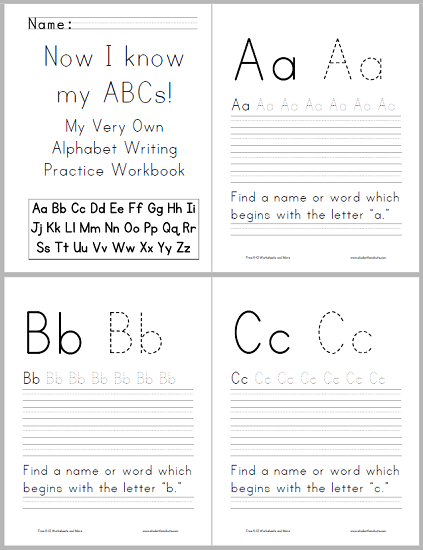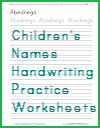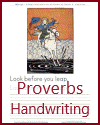| ABC Alphabet Workbook for Kids |
|---|
| www.studenthandouts.com ↣ Handwriting Worksheets ↣ Print Manuscript Writing Worksheets |
| This free printable ABC workbook gives each letter of the alphabet its own page. Children read and trace each letter in large and small fonts. Then, children are asked to find and write a name or word which starts with each letter. This booklet is 28 pages in length, including the front and back covers. The back cover features a complete traceable alphabet. |
 |
   |
|
Click here to print.
Teaching children how to write the alphabet plays a crucial role in preparing them for kindergarten in several ways. Fine Motor Skills Development: Learning to write the alphabet involves using small muscles in the hands and fingers. This practice helps children improve their fine motor skills, which are essential for activities such as holding a pencil, using scissors, and manipulating small objects, all of which are important in kindergarten. Pre-Writing Skills: Writing the alphabet lays the foundation for more complex writing tasks. Children begin by forming simple shapes and lines, which gradually progress into letters and numbers. These pre-writing skills help them gain control over their writing utensils and build confidence in their ability to create recognizable shapes and characters. Letter Recognition: Writing the alphabet reinforces letter recognition. As children practice writing each letter, they become more familiar with its shape, name, and associated sounds. This familiarity with letters is valuable for early literacy development, as it aids in recognizing and sounding out words. Phonemic Awareness: Writing the alphabet can also support the development of phonemic awareness—the ability to identify and manipulate individual sounds in words. As children learn to associate letters with sounds, they become better prepared to understand the fundamentals of reading and spelling. Cognitive Skills: The process of learning to write involves cognitive skills such as memory, sequencing, and problem-solving. These skills are essential for academic tasks in kindergarten, where students are expected to follow instructions, remember information, and complete assignments. Self-Expression: Writing allows children to express themselves creatively. Even before they can write words or sentences, they can draw pictures and create stories using the letters they know. This self-expression fosters creativity and confidence in their ability to communicate through written language. Readiness for Classroom Activities: Kindergarten often involves activities that require writing, such as tracing letters, writing their names, and completing worksheets. Children who already have experience with the alphabet are more likely to engage actively in these activities and feel comfortable participating in classroom tasks. Boosted Confidence: Successfully learning to write the alphabet boosts a child's confidence. It gives them a sense of accomplishment and readiness for more advanced writing tasks in kindergarten. This confidence can positively impact their overall attitude toward learning. Preparation for Reading: Writing is closely linked to reading readiness. The skills developed through writing, including letter recognition and phonemic awareness, support the development of reading skills, making children more prepared to tackle early reading assignments. Transition to School: Learning to write the alphabet helps children make a smoother transition to the structured environment of kindergarten. It provides them with a basic understanding of academic expectations and classroom routines. Teaching kids how to write the alphabet serves as an important foundation for their overall readiness for kindergarten. It promotes fine motor skills, cognitive development, letter recognition, phonemic awareness, and self-expression, all of which are crucial for success in the early years of school. Let us help you make your young scholar "kindergarten ready"! |
| CCSS.ELA-LITERACY.L.K.1.A: Print many upper- and lowercase letters. |
| CCSS.ELA-LITERACY.RF.K.1.D: Recognize and name all upper- and lowercase letters of the alphabet. |
| www.studenthandouts.com ↣ Handwriting Worksheets ↣ Print Manuscript Writing Worksheets |














































